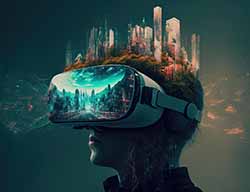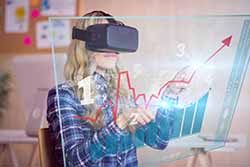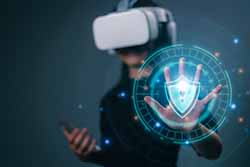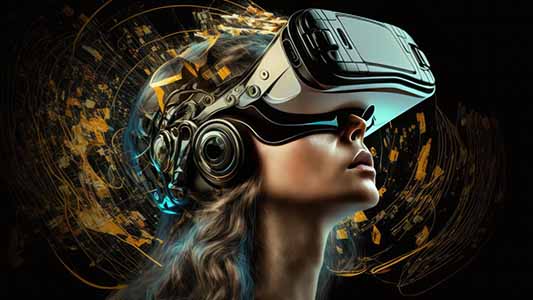The concept of the metaverse has captured the imagination of tech enthusiasts and futurists alike, promising a revolutionary shift in how we perceive and engage with the digital realm. The metaverse is essentially a collective virtual shared space, created by the convergence of physical and virtual reality, augmented reality, and the internet. In this article, we’ll delve into the key aspects of the metaverse and its potential impact on various aspects of our lives.
Defining the Metaverse:
The term “metaverse” was coined by Neal Stephenson in his 1992 science fiction novel “Snow Crash,” where it referred to a virtual reality space populated by avatars of real people. Fast forward to today, and this word metaverse is no longer confined to the realms of fiction. It encompasses a vast, interconnected digital world where users can interact with each other, as well as digital objects and environments.
Key Components:
Virtual Worlds: These are immersive digital environments where users can interact with one another through avatars. Popular examples include virtual reality spaces and online gaming platforms.

Augmented Reality (AR): It overlays digital content onto the real world, enhancing our perception of the environment. Devices like AR glasses can seamlessly integrate digital elements into our everyday experiences.
Blockchain and NFTs: The metaverse often relies on blockchain technology to make secure transactions and establish ownership of digital assets. Non-Fungible Tokens (NFTs) play an important role in representing unique digital items within the metaverse.
Interoperability: Successful metaverse platforms aim for interoperability, allowing users to move seamlessly between different virtual worlds and experiences.
Socio- Economic Impact:

The metaverse has the potential to reshape social interactions, providing a space for people to connect, work, and play in ways never before possible. Remote work could evolve into a fully immersive experience, transcending traditional video conferencing and fostering collaboration on a new height.
Economically, the metaverse introduces new opportunities for innovators, creators, businesses, and investors. Virtual real estate, digital goods, and experiences within the metaverse can be monetized, creating a new frontier for entrepreneurship.
Challenges and Concerns:
Despite its promises, the metaverse also presents challenges. Issues of privacy, security, and digital addiction must be addressed. The division between those who have access to advanced technologies and those who do not could exacerbate existing inequalities.
Future Prospects:

As technology continues to advance, the metaverse is set to become an integral part of our lives. Companies like Meta (formerly Facebook) are heavily investing in metaverse development, signaling a commitment to its potential. The evolution of AI, augmented reality, and virtual reality technologies will most probably play a pivotal role in shaping the metaverse of tomorrow.
In conclusion, the metaverse represents a new frontier in the digital landscape, offering unprecedented opportunities for connection, innovation, and economic growth. While challenges persist, the ongoing development of this virtual realm promises a future where the lines between the physical and digital worlds blur, creating a truly immersive and interconnected digital experience for users around the globe.
Pros of the Metaverse:

Social Connectivity: One of the most touted benefits of the metaverse is its potential to enhance social interactions. Through virtual worlds and avatars, individuals can connect with others globally, fostering a sense of community and breaking down geographical barriers.
Enhanced Work and Collaboration: The metaverse has the potential to redefine the workplace. Remote collaboration could evolve into immersive experiences, allowing teams to work together in virtual spaces. This could enhance creativity and productivity while accommodating flexible work arrangements.
Economic Opportunities: The metaverse introduces new economic frontiers. Virtual real estate, digital goods, and experiences within these digital realms can be monetized, providing opportunities for entrepreneurs, creators, and investors to thrive in a novel economic landscape.

Technological Advancements: The development of the metaverse necessitates advancements in technologies such as virtual reality (VR), augmented reality (AR), and blockchain. These technological strides not only contribute to the growth of the metaverse but also have the potential to spill over into other areas, driving innovation and progress.
Cons of the Metaverse:
Privacy and Security Concerns: The immersive nature of the metaverse raises significant privacy and security challenges. Users’ personal data, interactions, and virtual identities become susceptible to breaches, potentially leading to identity theft or unauthorized access to sensitive information.

Digital Addiction: As the metaverse becomes more immersive and engaging, there is a risk of increased digital addiction. Spending extended periods in virtual spaces may lead to a disconnect from the physical world, impacting mental health and well-being.
Inequality and Access: The metaverse has the potential to exacerbate existing social and economic inequalities. Access to advanced technologies required for meaningful participation in the metaverse may create a divide between those who can afford to engage fully and those who cannot.
Ethical Dilemmas: The metaverse poses ethical challenges, such as the creation and trade of non-fungible tokens (NFTs) and virtual assets. Determining ownership, authenticity, and the environmental impact of blockchain technologies used within the metaverse raises complex ethical questions that need careful consideration.
In conclusion, the metaverse is a double-edged sword, offering exciting opportunities while posing substantial challenges. Striking a balance between the benefits and drawbacks requires thoughtful regulation, ethical considerations, and ongoing technological advancements. As we step into this digital frontier, a comprehensive understanding of the metaverse’s pros and cons will be essential in navigating its impact on our social, economic, and personal lives.












